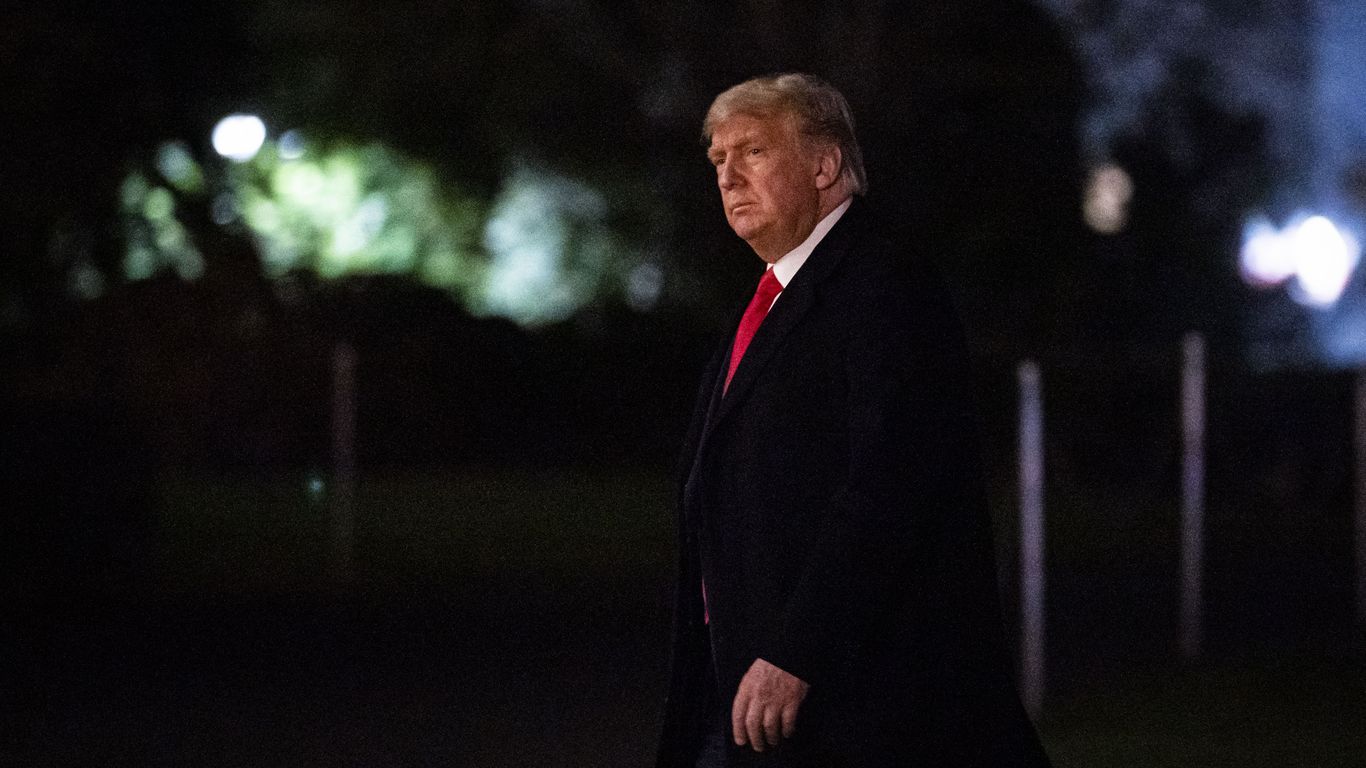President Trump defied Congress on Wednesday, vetoing the National Defense Authorization Act (NDAA).
Why it matters: The House and Senate passed the $740 billion defense spending bill with veto-proof majorities, setting up a potential override fight.
- The House is set to reconvene for a vote on Dec. 28, with the Senate following on Dec. 29 if the House vote is successful.
Driving the news: Trump had previously pledged to veto the bill if Congress did not repeal Section 230 of the Communications Decency Act, which grants liability protections for social media companies.
- Trump also opposes legislation in the bill that proposes renaming 10 military installations currently named after Confederate leaders.
What he’s saying: “The Act fails even to make any meaningful changes to Section 230 of the Communications Decency Act, despite bipartisan calls for repealing that provision,” Trump said in a message to the House Wednesday.
- “My Administration recognizes the importance of the Act to our national security. Unfortunately, the Act fails to include critical national security measures, includes provisions that fail to respect our veterans and our military’s history, and contradicts efforts by my Administration to put America first in our national security and foreign policy actions,” he added.
- “It is a ‘gift’ to China and Russia.”
Several Democrats swiftly criticized Trump’s move.
- House Speaker Nancy Pelosi (D-Calif.): “The President’s veto of the National Defense Authorization Act is an act of staggering recklessness that harms our troops, endangers our security and undermines the will of the bipartisan Congress. … Next week, December 28, the House will take up the veto override with bipartisan support.”
- Senate Minority Leader Chuck Schumer (D-N.Y.): “Donald Trump just vetoed a pay raise for our troops so he can defend dead Confederate traitors. Democrats will vote to override it.”
- Rep. Adam Smith (D-Wash.), chairman of the House Armed Services Committee: “While the President may not care about our service members & their families, Congress still places an immense value on their service & sacrifice.”
- Sen. Jack Reed (D-R.I.), ranking member of the Senate Armed Services Committee: “Sad that Pres Trump seems more devoted to divisive symbols of the Confederacy than to U.S. troops. Congress must prioritize nat’l defense & override Trump’s veto.”
Many Republicans also took to Twitter to emphasize the importance of the NDAA.
- Sen. Jim Inhofe (R-Okla.), chairman of the Senate Armed Services Committee: “I hope all of my colleagues in Congress will join me in making sure our troops have the resources and equipment they need to defend this nation. … We can and should use another legislative vehicle to repeal Section 230 of the Communications Decency Act – a priority @realDonaldTrump and I share.”
- Sen. Mike Rounds (R-S.D.): “#NDAA is one of the few things in Washington that passes every year with broad bipartisan support, and I anticipate a veto override vote will follow suit. We owe this to the men and women who defend the United States of America.”
- Rep. Denver Riggleman (R-Va.): “As an @usairforce Veteran, I know how important the #NDAA is to our military community. This is an irresponsible veto. We shouldn’t be politicizing our National defense. WILL OVERRIDE!”
Sen. Lindsey Graham (R-S.C.) said he supported the president’s call to repeal Section 230 and would not vote to override the veto.
- “Congress should vote to Repeal Section 230 as requested by President @realDonaldTrump. I will not vote to override presidential veto unless effort is made to wind down Section 230,” Graham tweeted.
The big picture: The president signed an executive order in May to limit the powers of Section 230 but sought to repeal it completely through Congress.
- The defense bill also includes provisions that would increase pay for troops, strengthen anti-discrimination protections for federal employees, allocate funding for countering China and improve national cybersecurity, now a top concern after a months-long cyberattack compromised government agencies and companies.
- The bill has been passed by Congress every year since 1967.
Editor’s note: This story has been updated throughout.
